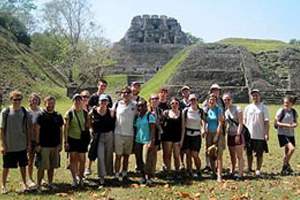|
|
|
Feb 03, 2026
|
|
Undergraduate Catalog 2014-15 [ARCHIVED CATALOG]
Geography (BA.SSC.GEO)
|
|
 Return to: Majors & Minors Return to: Majors & Minors

Geography is concerned with understanding the Earth as home to humans. Geographers attempt to describe spatial patterns (what phenomena are located on the Earth's surface, and where they are located) and to analyze those patterns (why those phenomena are located where they are, and how they are related to each other). In so doing, they typically address one or more of the following themes: location, place, region, movement, and human-environment interactions.
Upon completion of the Geography major, students will be able to:
- Communicate spatial concepts visually, orally, and in written form.
- Interpret, use, and analyze maps and other geospatial representations.
- Identify relevant physical and human systems and apply them to the study of the Earth, its regions, and its places.
- Identify, describe, and analyze human and physical systems and their impacts on each other.
- Use geographical ideas to understand past and present conditions and plan for the future.
To major in Geography, the student and the coordinator of Geography (who becomes the student's academic advisor) initiate a written Social Science Major-by-Contract with the following stipulations:
- Drawn up by the student and two faculty members, one representing the principal discipline (Geography) and one representing an appropriate secondary discipline.
- Approved and signed (normally by the time the student has reached the fifth semester or 75 credits) by the student, the two faculty sponsors, the coordinator of Geography, the chair(s) of the department(s) involved, and the academic dean.
- Subject to modification at the request of the student or advisor; any modifications must be agreed to by all parties to the contract.
The written contract will state how the student is to complete a minimum of 48 credits to be distributed as follows:
- At least 21 credits in Geography, including a 4000-level Independent Study
- At least 18 credits in the secondary discipline
In addition:
- At least one course in History (3 cr)
- At least one course in two of the following disciplines: Economics, Environmental Studies, Global Studies, Political Science (6 cr)
- Included among all the 48 credits earned, at least 12 credits must be at the 2000-level and 12 credits at the 3000-level.
Cross-listed courses may be used to fulfill these requirements, but the same course cannot be used to fulfill both the principal and the secondary disciplines requirements. Courses used to satisfy the above requirements may also be used to satisfy the general education requirements.
|
|
|
 Return to: Majors & Minors Return to: Majors & Minors
|
|
|